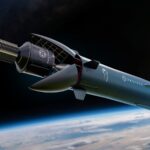Implant Sciences [IMSC], which for the past year-and-a-half has enjoyed marked success with global and domestic sales of its explosives trace detection (ETD) systems, has agreed to acquire a small French company that develops personal flight systems as it continues to entertain potential buyers for its trace technology.Implant on July 21 announced the deal for Zapata Industries, which has developed and flown the Flyboard Air, a small flying platform with an independent propulsion system that a person stands-on to maneuver…
Recommended

Rocket Lab Hits Record Revenue In 2025, But Delays Neutron Launch

Nominal Supports Navy With Software Test Infrastructure Layer In Recent CCA
Trending
Congress Updates
Wicker Wants Legislation On DoD’s Equity Investments In Minerals Supply Chain
Legislation regarding equity investments by the Defense Department in critical mineral supply chains is needed to strengthen the larger defense industrial base and demonstrate to the “free market” that the […]
“Not Sure How They Get To Where They Wanna Be,” Calvert Says of $1.5 Trillion Defense Topline Proposal
As the federal government enters a third week of tardiness in a fiscal 2027 budget release, a big question is how the Pentagon will be able to spend $500 billion […]
Path Uncertain For $1.5 Trillion FY ‘27 Defense Topline After Trump Casts Doubt On Second Reconciliation Bill
The path to achieve the White House’s call for a $1.5 trillion defense topline in 2027 appears murkier now after President Donald Trump has cast doubt on the prospects of […]
Senate Budget Dems Push For Defense Reconciliation Spending Details, Cite ‘Slush Fund’ Concerns
Democrats on the Senate Budget Committee have raised “significant concern” with the Pentagon’s move to classify reconciliation spending plans, urging the department to provide more public details on how the […]
Job Feed
-
Cleared R&D Manager
Inertial Systems, Onsite - Sandia National Laboratories - Albuquerque, NM -
Cleared Early Career Operations Information Management Professional
Special Programs, Onsite - Sandia National Laboratories - Livermore, CA -
Police Sergeant
Saddleback College - Mission Viejo - Saddleback College - Mission Viejo, CA -
Supervisory Power and Operations Planning Specialist / Meteorologist / Operations Research Analyst
USA Jobs - Portland, OR

 By
By 








